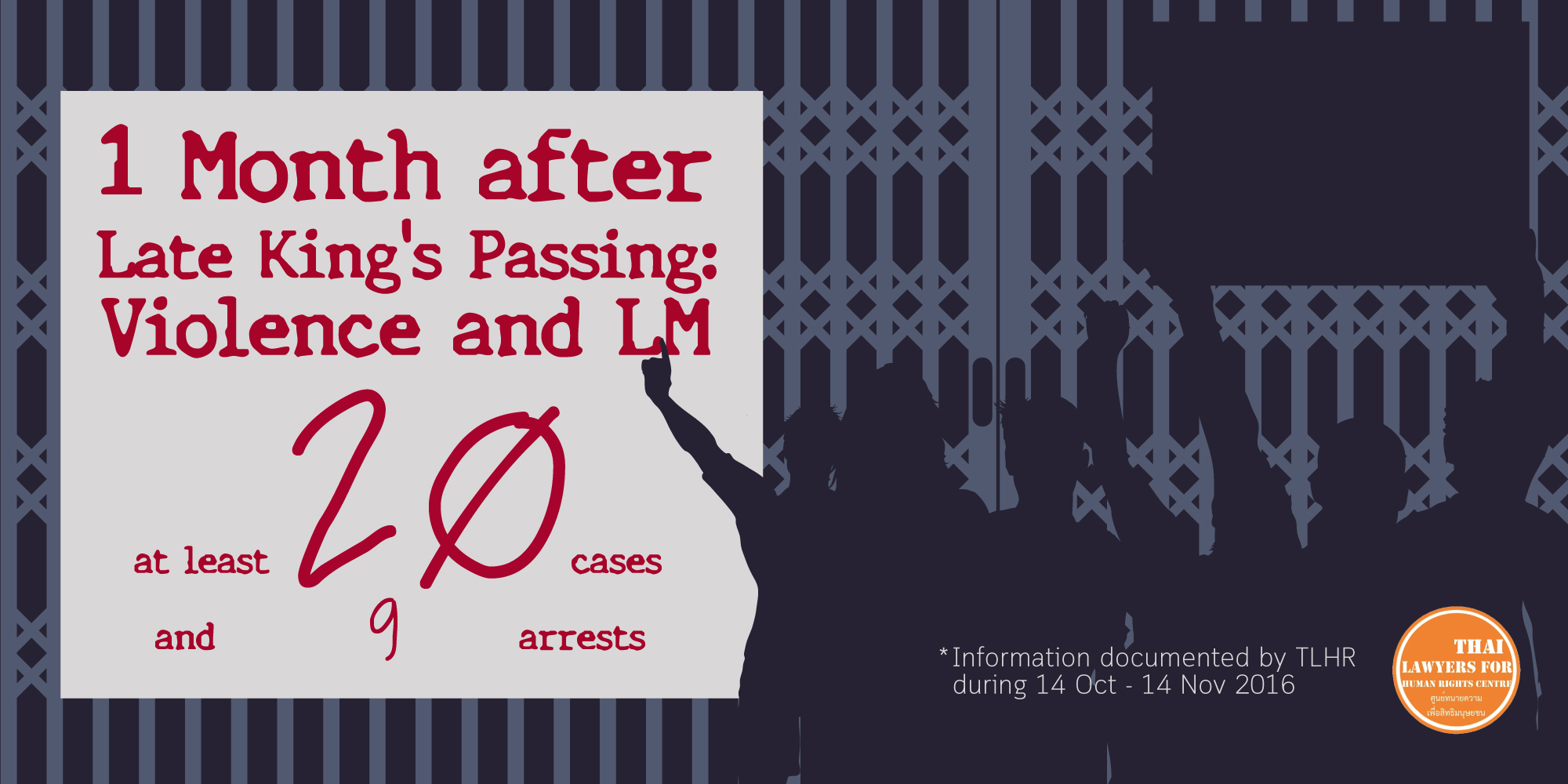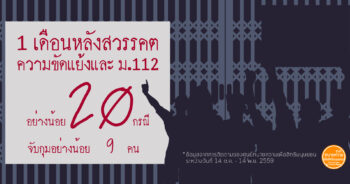One month after the passing of King Bhumibol Adulyadej on 13 October 2016, amidst the somber mourning of the Thai populace, diverging opinions on the Thai monarch have induced conflict among the people, both online and offline. Such schisms have led to “witch hunting” and the use of violence among civilians.
Meanwhile, prosecutions of Article 112 of the Criminal Code, or lèse majesté offence, have risen sharply. In the past three or four weeks, the Royal Thai Police has regularly reported updates on the number of lèse majesté cases lodged and arrests made, in contrast to the previous silence the police usually maintained. Many government agencies have also been assigned to monitor anti-monarchist comments, both at home and abroad. This has resulted in more surveillance of Thai exiles. Political exiles have been the NCPO’s concern too, and the government has stated it is attempting to seek cooperation with embassies to extradite them.
This report is an overview of violence and prosecutions as the result of lèse majesté conflict in the past month. During the transitioning period of a major pillar of Thai society, Thailand has employed the lèse majesté offence in different ways to deal with dissenting voices against the monarch.
Royal Thai Police, “27 Lèse Majesté Cases”
After 13 October, the Royal Thai Police has released in its weekly press conference the number of lèse majesté prosecutions, which shows an increase every passing week. According to the Royal Thai Police, on 19 October, there were 12 “alleged offenders” under lèse majesté charges. Then on 25 October, the number had increased to 20, and then on 31 October, to 25.
The latest press conference on 9 November 2016 suggests that 27 persons have been charged for lèse majesté offences since 13 October, while ten of them have been arrested and 17 remain at large. Further, the police stated that there were 194 lèse majesté cases prior to 13 October, although it failed to specify the specific timeframe of said prosecutions.
According to Thai Lawyers for Human Rights (TLHR), there are 20 reports of lèse majesté prosecutions as well as vigilante violence by the public after 13 October. To our knowledge, nine of the alleged offenders have been arrested out of the 20. The incidents also have happened outside Bangkok, particularly in Southern and Eastern Thailand, with only a few numbers in Northeastern Thailand and Bangkok.
Most of the alleged acts were posts on online platforms with only five out of 20 made as speeches and materials in the physical world.
Meanwhile, the past month has seen other notable incidents, including public vigilante actions against dissenters, prosecutions of alleged anti-monarchist comments of persons that do not fall directly under the lèse majesté offence, the abuse of the lèse majesté offence in personal conflicts, and the prosecutions of persons with histories of mental health problems.
Social Sanctions
The rise of lèse majesté prosecutions during the past month was partly the result of public pressure. In some cases, a large number of people gathered to pressure the authorities to file lèse majesté charges against dissenters, or to do so themselves. The incidents of public violence have included physical assaults, encircling the residence of an alleged offender, forcing the person to pay homage to the King’s portrait, and citizens’ arrest, all of which are unlawful.
In Phuket, hundreds of people gathered around a soybean milk shop after the owner’s son posted anti-monarchy messages on Facebook. The mob put up many signs with abusive words in front of the shop. They requested the authorities to take legal action against the alleged offender and later filed the charge themselves. Subsequently, the accused was arrested and charged with lèse majesté.
Similarly in Phang Nga, hundreds of people gathered in front of a roti shop to pressure the owner to hand over his son, a marine who allegedly posted anti-monarchy messages online. The crowd demanded that the marine apologise to the public. The police and the military officials had to intervene to calm the mob down. They confirmed that the marine would face legal actions and disciplinary punishment before the crowd dispersed. Later, the authorities reported that the said marine was arrested and was to be prosecuted.


In Eastern Thailand, a similar incident occurred with a grocer (48) who was under psychiatric treatment. His shop was surrounded by a mob shouting abusive words until the police intervened and the grocer eventually admitted his crime and paid homage to the King’s portrait. The authorities still had to prevent him from being assaulted by some of the crowd after the homage. The Rayong Provincial Court later issued an arrest warrant against him for lèse majesté.
In Chonburi, a factory male worker (19) who sold collectible coins posted comments deemed defamatory to the monarch during an online argument with commenters in a Facebook group. The commenter screen-captured the said comment to file a charge of lèse majesté against the worker. About 20 persons also ransacked his room, then beat and assaulted him before taking him to pay homage to the King’s portrait in public. The authorities had to intervene to stop the violence, and then later arrested the worker to proceed with the legal action.
Similarly in Chanthaburi, a group of people accused a middle-age woman of recording a statement deemed anti-monarchy in a book of condolences put up for the community to pay respect to the late King. The Community Chairperson asked the local people to apprehend the lady and then had the police take her to further press charges.
The public also pressured the authorities in cases of alleged offenders who are already in custody. In Koh Samui, in the southern province of Suratthani, people had accused a female Facebook user (43) who posted online defamatory messages of lèse majesté. After the police pressed charges against her, about a hundred people gathered in front of the police station. Stating that they were present to see the suspect, the mob cursed her with offensive speech and pressured the authorities to have her prostrate herself before the King’s portrait in front of the station.
Note that some “social media” and “mass media” agencies have played an important role in stirring the public anger, hatred, and violence. Headlines with strong wording, news with inciting or distorted content, prejudging suspects, mobilization and instigation of public on online platforms, and reckless use of violence against the suspects have all contributed to such public violence.
Dissenting Opinions against Persons Not Consisting of the Elements of Lèse Majesté
THLR has found that some of the post-13 October lèse majesté alleged offenders are facing legal actions as a result of their critical posts against the government’s management after the royal passing. Some opinions on the social climate or consisting of a personal response to online chatter, rather than criticism of personages desginated under Article 112 of the Criminal Code have nevertheless resulted in charges of lèse majesté.
In the northeastern province of Bueng Kan, the Damrong Tham Center reported to the police that it deemed a 19-year-old girl’s Facebook post defamatory to the monarch, despite its contents actually criticising the suspension of celebratory events in the wake of the King’s passing. The authorities later arrested and charged her with lèse majesté.
The aforementioned case in Phang Nga reveals this practice as well. Prachatai, an alternative online news outlet, reported that the marine’s actual post only questioned online users about whether they loved their own father like they did the King. There was reportedly no other comment that could conceivably fall under the ambit of lèse majesté.
Similarly, the Facebook post of the Chonburi factory worker was directed towards the commenters who were engaged in an online argument with him, not any of the personages directly protected under Article 112.

The factory worker in Chonburi being beaten by a mob and forced to pay homage (Picture: Facebook ‘Bangpakong Newsman’)
Such cases reflect the abuse of Article 112 against dissenters, through accusations of wrongdoing based on vague wording and broad interpretation. The article has been continuously used to prosecute individuals who expressed opinions that do not come under the ambit of the offence, in contrast to the principles of criminal law whereby strict interpretation must apply.
Incrimination as a Result of Personal Conflict
Another feature of the lèse majesté prosecutions after 13 October is the practice of a Facebook impostor using lèse majesté messages to frame persons for reasons of personal conflict. In Kantang District, in the southern province of Trang, a woman (17) and her husband reported to the police at the Kantang Police Station that a Facebook impostor posing as herself had been posting messages deemed defamatory to the monarch. They suspect that her husband’s ex-boyfriend (a 29-year-old homosexual guy), whom she previously quarreled with, had created the account, and used her picture and her name to intentionally frame her. The authorities reportedly set up an investigation team. The suspect has not been arrested yet.
In a case in Koh Phangan, a technical college student (16) created a fake Facebook account using the personal information and picture of his girlfriend’s stepmother, then started posting several messages breaching Article 112 to frame the stepmother. Reportedly, his girlfriend was not on good terms with her stepmother and felt her father had been taken away from her. In the beginning, the police arrested the stepmother, but after her statement, the police did a further investigation and arrested the said technical college student to proceed with legal action.
The incrimination and framing of individuals with lèse majesté does not mark an entirely new trend. In the past few years, there has been evidence of similar cases during political unrest, including a case where an older brother framed his younger sibling for anti-monarchy speech, due to their personal conflict. However, the Civil Court and the Appeal Court acquitted the case. Another case is the Facebook impostor of Ms Jaruwan, who published anti-monarchy messages. The authorities arrested and charged Jaruwan and two men with lèse majesté. Later the police and the military prosecutor dismissed the case.
The practice also reflects a deficiency in the law concerning Article 112, which allows anyone to press charges against others. Given the harsh penalty and the tendency for pre-trial detention, lèse majesté has been abused time and again to avenge personal conflicts, regardless of the parties’ political opinions
Prosecutions of Persons with Psychological Disorders
One ramification of the post-coup lèse majesté charges concerns suspects with histories of mental health problems also being prosecuted. According to the TLHR, at least seven cases are proceeding against alleged offenders or defendants who have previously received treatment for psychological disorders. In general, these individuals can communicate with others in normal social encounters; however, they may suffer from hallucinations, distorted perceptions of reality, and may at times imagine themselves as authority figures. They may act in ways found disturbing by other people, and are unable to control themselves. Therefore, they are in need of treatment and regular medication. The arrests and prosecutions against them further compromise the treatment for their conditions, as well as constitute abuse of the law.
After 13 October, conflict and violence for alleged acts that the general public deems anti-monarchy directed against persons who have been psychiatrically diagnosed have increased. In Rayong, the Deputy District Chief reportedly visited and investigated the aforementioned grocery store, and found that the grocer suffered from mental illness. His wife stated that he had failed to take the medication prescribed by the doctor, thus was prompted to say random things unconsciously.
In Bangkok, a middle-aged woman dressed in a blue shirt was scolded by other passengers on the bus, for allegedly giving continuous defamatory speeches against the monarch. When she got off the bus, one woman followed her and slapped her in the face. The officials later found out that the middle-aged woman had a history of mental illness and was in treatment. Reportedly she regularly says offensive and abusive things against others unconsciously, is always loud, and usually runs away from home. An eyewitness of the event posted on social media that the woman had been speaking of the “King of Underworld” rather than the late King Bhumibol.
In the aforementioned case where a woman dressed in orange inscribed the book of condolences in Nonthaburi, a photo was taken and shared online, along with her personal information, by a passer-by. This led to many online condemnations by the public. The Governor of Nonthaburi looked into the case and later stated to the media that she suffered psychological disorders, including hallucinations and malfunctioning communication skills. However, her alleged statement on the condolence book does not contain abusive words, nor breaches any laws.


The woman in an orange dress who inscribed a book of condolences for the late King and was later subjected to an online witch-hunt. She also suffered from mental illness. (Picture: Manager Online)
These incidents are illustrative of the abuse of Article 112, prejudgement and ignorance of the surrounding context, as well as the lack of social understanding and tolerance of individuals diagnosed with psychiatric conditions.
Military Government and Its Clampdown on Freedom of Expression
Apart from arrests and prosecutions of persons for lèse majesté, the government agencies’ transition after the King’s passing suggests the potential for further conflict in relation to the offence in the future. The junta’s response to the public violence, the shifting in government structure, online censorship, and the hunt for overseas exiles all point to foreseeable developments that Thai society will encounter.
The Response of the Junta and the NCPO
Amidst confusion and conflict throughout Thailand, attention to the positioning and response taken by the military government and the NCPO is crucial to anticipate what lies ahead in the transition period. Some have pointed to the junta’s attempt to quell public violence, as when Gen Prayuth Chan-ocha, PM and the Head of the NCPO, stated in an interview that the public should not condemn those who do not wear black. He remarked that not dressing in black does not suggest disrespect to the King, and offered an alternative of pinning a black ribbon or dressing in monotone instead, in the wake of concern that public and online condemnation might lead to physical violence.
During a press conference, Col. Piyaphong Klinphan, Spokesperson of the NCPO, noted that the NCPO was concerned with violence among the people. According to him, the public should leave it to the law enforcement agencies to press charges, arrest, and proceed with legal actions against anyone, in accordance with the law and with legal institutionalised measures.
On the other hand, some actions of government officials have suggested support for the increasing conflict and social sanctions of alleged dissenters, or have encouraged the public to act on behalf of the state. In his interview with the press on 18 October, Justice Minister Gen. Paiboon Khumchaya, acting as the Chairperson of the Committee to Prevent and Resolve National Security Cases in the Kingdom, commented on the vigilante actions against alleged lèse majesté offenders that “nothing is better than social sanctions”, to stress that such incidents reflected the people’s unbearable anguish.
On the following day (19 October), Gen Paiboon explained to the press that by “social sanction,” he meant supportive measures in addition to the existing enforcement of the law. He noted that the law alone cannot adjust the people’s attitudes and thus social sanctions fill the gap. Further, he insisted that “social sanction” is different from “mob rule,” where the latter is an unlawful act since no one has the right to physically attack others. However, if an attempt is needed to prove Article 112 has been violated then social sanction is in order.
In his press interview on 8 November, Gen Paiboon affirmed his idea that to track down lèse majesté offenders “law enforcement or mob rule might not work in some cases, [but] social sanction based on people’s cooperation could rein them in.” However, he failed to substantially explain what concrete actions social sanction constitutes. Such an opinion of an authority figure may in fact encourage people to act on their own and simply exacerbate the violence.
Restructuring the State Agencies
Apart from the existing government agencies assigned to monitor the violation of Article 112 on online platforms after 13 October, many agencies have been restructured to contribute to their monitoring as well. The government has set up an ad hoc task force, the “Command Center to Monitor the Situation (CCMS)” with Gen Wilart Arunsri, the Secretary of the Prime Minister as its Director. Apart from keeping the public informed of activities related to the royal succession, the CCMS is tasked to monitor the situation related to “public order” and the dissemination of news that might compromise “national security.” The Ministry of Justice has designated the Director General of the Department of Special Investigation (DSI) to work in collaboration with the Director of CCMS and the Ministry of Foreign Affairs and other government security agencies.
The “security agencies” within the Royal Thai Army have also been reformed to monitor online platforms, with a change from “Military Technology Center” to “Army Cyber Centre,” inaugurated on 1 November. One of its missions is to monitor dissenters, at home and overseas.
There was also some rearrangement within the Internal Security Operations Command (ISOC). From six Command Centers, the agency was downsized to five Command Centers where the first Command Center now takes part in educating the public in His Royal Highness’s duties and projects, formerly the task of the sixth Command Center. The first Command Center also monitors online content deemed defamatory to the monarch and collaborates with the Army Cyber Centre.
Over 900 URLs Blocked
In addition to the restructuring of government agencies, monitoring of online platforms has been intensified. More personnel have been assigned to the task, and more restrictions and bans have been placed on websites with sensitive information and contents deemed to fall under the offence of lèse majesté. On 2 November, ACM Prajin Juntong, the Deputy Prime Minister and Interim Minister of Digital Economy and Society (DE), revealed that from a survey during 1-12 October, more than 200 URLs with defamatory messages were found and during 13-31 October, the number was more than 1,200 URLs.
ACM Prajin explained that the government has invoked the Head of the NCPO Order to ban access to the said 200 URLs that are domestically hosted. The other 1,150 URLs with foreign host await the court’s order to be shut down. With 700 URLs being met with such orders, it has so far amounted to 900 banned URLs, most of which were on YouTube.

Webpages blocked by the Digital Economy and Society Ministry (DE)
The DE Ministry has also assigned more personnel to monitor online platforms, in collaboration with the Technology Crime Suppression Division’s (TCSD) 60 officers, and the IT Crime Prevention and Suppression Bureau’s 30 officers. The combined force stands at over 100 persons with the mission to monitor online platforms 24/7.
In addition, ACM Prajin, representing the government, has met with executives of major service providers and chat program companies, including Google, YouTube and Line, seeking their cooperation to suppress and ban access to contents deemed defamatory to the monarch. According to ACM Prajin, all have cooperated with the Thai government.
Nevertheless, Line later publicly stated that there was no agreement or cooperation with the government’s request. It stated that personal information of Internet users would be granted to the Thai government only through diplomatic and international law channels. Google also denied it has cooperated.
Hunting Down Overseas Dissenters and Their Families
Overseas Thais with dissenting views against the monarch have been the focal point of the NCPO as well. The military government and the NCPO have requested many governments to extradite alleged lèse majesté offenders to proceed with legal action in Thailand.
On 19 October, Justice Minister Gen Paiboon revealed that the government had sent a letter to seven embassies in Thailand from countries where 19 alleged offenders under Article 112 are residing. The letter reportedly describes the mourning period of Thais after the passing of the King and asks for sympathy, in addition to providing personal information of exiles and dissenters living in each country. However, the government did not disclose the names of the seven countries.
Later, the Phnom Penh Post reported that the Cambodian Ministry of Foreign Affairs had stated that the Cambodian government had received an extradition request from the Thai government, asking it to return three lèse majesté suspects. The Cambodian authorities maintained that there is no such offence in Cambodia, and thus they cannot meet such a request. The Thai authorities subsequently blocked this news report.
The Minister of Foreign Affairs, Mr Don Pramudwinai, stated on 25 October that the government had also sent letters to seek cooperation from other countries to track down lèse majesté exiles. However, he admitted that if other countries do not have such an offence, the cooperation might not be granted.
In addition, the Prime Minister has reportedly assigned agencies to identify the countries with which Thailand has extradition treaties, and the history of Thailand’s cooperation in extradition requests, in the hope that the information shall be useful to plan future action. The Police Commissioner General reportedly has sought coordination with Interpol to monitor lèse majesté exiles.
TLHR has received information that the authorities approached and monitored relatives or families of exiles, regardless of the family’s dissociation with the alleged offender’s political activities. About 10 authorities visited the family residence of a Thai political exile, and took her sister to the TCSD and demanded the rest of the family to join. The authorities allegedly asked the family personal information about the said exile, and seized their cellphones without a warrant.
In another case, the officials at the Crime Suppression Division (CSD) have approached parents of another Thai exile, and asked them to cease their child’s comments on the monarch. When the parents stated that they had not contacted each other for a long time, the officials asked them to record a video pleading their child to stop, and stated that they would deliver the video directly to the exile.






